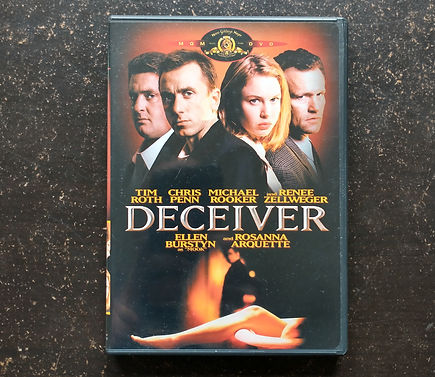
Deceiver-Jonas & Josh Pate
Deceiver came across my "desk" after having been highly recommended by my good friend Konstantine, whom I often talk about a wide variety of things with—hip hop, movies, diplomatic relations (he's Russian), and culture—whose opinion I respect very much.
Konstantine knows full well my love of the actors Tim Roth, Michael Rooker, and Chris Penn and so when he suggested this title and was even courteous enough to bring me the DVD I jumped at the chance.
It was very surprising to me that I had never even heard of this film before. It packed all of the fancy-tickling elements: Good actors, noir, and criminal subterfuge.
Equally surprising was—once the credits began to roll—its status of verifiable dud.
Granted, I did watch this film as I do most films nowadays, and that's as I wrap up the evening in bed, often turning off the television when the head nods take over and picking up the following night from a spot I remember best.
This one was a bit hard to follow at times, but the pieces eventually became mended after you took the time to figure things out. This was deliberate, as the main feature of Deceiver is constantly keeping the viewer in suspense as to who the true villain is in this psychological game of cat and mouse.
The skinny of this one is about an aristocratic textile heir named Wayland (Roth) who is both an epileptic and unconventional genius and is the prime suspect for a rather heinous murder. Call girl Elizabeth Loftus (Zellweger) was found sliced in half and it's up to Ice Cold Detective Kenneshaw (Rooker) and bumbling degenerate partner Braxton (Penn) to solve the crime.
It begins with a lie detector test, which Wayland passes with ease. Kenneshaw doesn't buy it and upon closer examination of Wayland's pupils, believes that Wayland had taken drugs before the test to suppress his nerves. When pressed upon this issue, Wayland admits to having taken drugs—but only his prescription for epilepsy. The trio then begins another game of cat-and-mouse dialogue and Wayland is rather arrogant and calm when the detectives attempt to corner him with evidence. More information about Wayland's character is revealed as the interrogation progresses. He is a severe alcoholic who loves Absinthe. When the detectives mention that Absinthe can induce both hallucinations and blackouts, Wayland embraces this as a fact of life and doesn't seem to care that, by such a careless admission, he could be implicated in Loftus's murder.
Scenes then intersperse of Wayland, Kinneshaw, and Braxton to shed some light as to the demons each man is in a losing battle against. Kinneshaw is into a local mob boss(ess) for a gambling debt of $20,000.00, Kinneshaw is having severe marital problems, and Wayland is an alcoholic disgrace to an otherwise wealthy family of great prominence with equally great fissures within its posterity.
Eventually, Wayland produces evidence implicating both men of their misdeeds that could potentially lead to them as the suspects of Loftus's murder and the tables then turn in Wayland's favor and he becomes the interrogator.
This all leads to a conclusion that is supposed to act as the Keyser Soze heart pinprick; but lands—more or less—with the impact of a wadded-up tissue thrown from across the room and failing to reach the inside of a trash receptacle.
One of the common threads of critique I received about Broad Street Tully was the overabundance of words. "It's too wordy." And this wasn't just by one person, but a few. Eventually, I hope to tighten up my prose and become a little more succinct, but for a rookie, I still feel as if it is not a bad piece of work. I mention this to correlate with what I think is the issue of Deceiver. The directors wished to create a labyrinth of lies but got lost along the way by carving too many paths; forfeiting so much of the intrigue that it felt as if sitting with the trio in that dim interrogation room for as long as we did, wasn't worth the payoff in the end.
If you're demanding the viewer to pay attention to a vast amount of layers, the bulk of which are dialogue, then you damn sure need to write the shit out of that son of a bitch.
Heat, The Usual Suspects, Twelve Angry Men, Chinatown, and L.A. Confidential got this memo and nailed the noir bullseye.
Deceiver did not.
A lot of times it felt as if they pulled rabbits out of hats to explain why a certain character would act the way they do, rather than take the time to character study and develop these people into who we, as the audience, are expected to receive them as.
Most films like this I love, but with the obvious lack of depth and over-dependency of the actors' status to carry the burden created by sketchy and lazy writing, it just failed.
Sorry Konstantine.
But much love.
Stars: **
Verdict: Skip
Cousins: Closer, The Usual Suspects, L.A. Confidential, Reservoir Dogs, The Big Lebowski